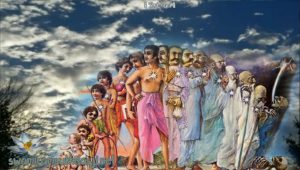
यथा सर्वेषु शास्त्रेषु प्रोक्ताश्चत्वार आश्रमा:।
गीतया न तथा प्रोक्ता: संकेतेनैव दर्शिया:॥
yatha sarvesu sastresu proktascatvara asramah
gitaya na tatba proktah samkete naiva darsitah
In the Gita, there is a clear description of the four social orders – priest class, warrior class, mercantile class and labor class as ‘The four social orders were created by Me’. (4/13); ‘The duties of Brahmanas, Kshtriyas, Vaisyas and Sudras have been divided according to their inborn qualities’ (18/41) and so on. But there is no such clear description of the four stages of life -celibacy, household, retired order and renounced order. Their description is secondary in the form of a signal as:-
(1) Desiring that Supreme Goal, (God-Realization) the celibates practice continence, (8/11) there is a mention of Celibacy.
(2) He who enjoys gifts himself, without giving others their share, is undoubtedly a thief (3/12); and ‘Those sinners who cook for the sake of nourishing their own body alone eat only sin’ (3/13). It can be applicable to the house holders.
(3) ‘Some offer sacrifice in the form of austerities’. It may show retired order.
(4) ‘He who has abandoned all possessions’ (4/21). It signals renounced order.
In the Gita, the reason for the clear description of the social orders and the description of the stage of life in the form of signals is that it was the context of war in which Arjuna had to fight as a warrior. So there is a more detailed description of the duty of the members of the warrior class than those of the three classes.
Secondly, in the scriptures it is mentioned that a person should change the stage or order of life so that he may attain the final goal. But the Gita holds the opinion that a man can attain the Supreme Goal (God-Realization) in all circumstances, social orders and stages of life without changing them, by performing his duty. Not only this but even the terrible action of participation in the war may lead a member of the warrior class to salvation. So far as salvation is concerned, the change in the stage of life does not make any difference. The difference in the social orders is important only for the performance of one’s own duty. So the Lord has clearly described the four social orders. The description of the stages of life also comes within it. From this viewpoint also, there is no need of the independent description of the stages of life.